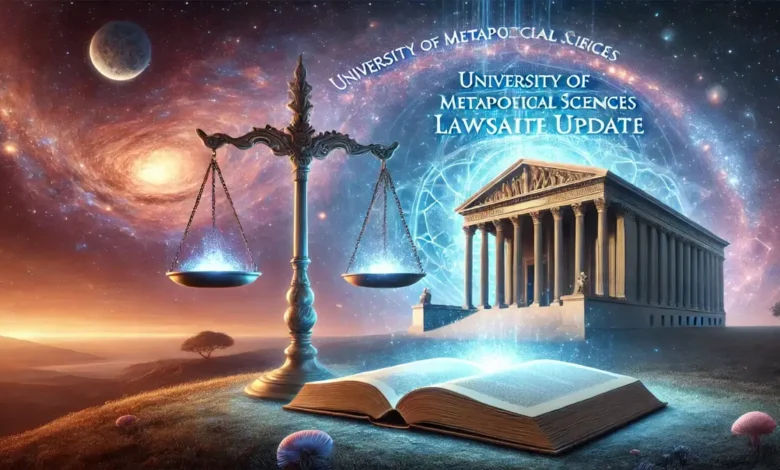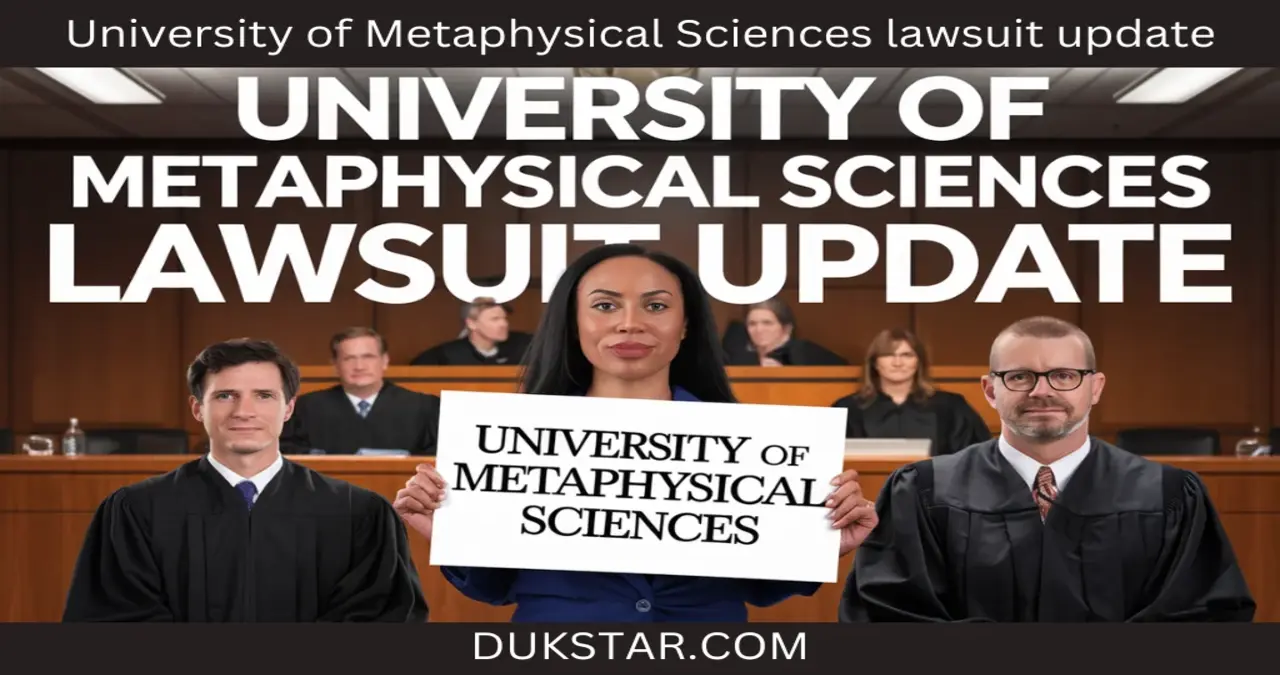University of Metaphysical Sciences Lawsuit: An In 1Depth Look at the Case and Its Implications

University of Metaphysical Sciences Lawsuit: In recent years, the University of Metaphysical Sciences (UMS) has garnered attention not only for its unique curriculum, which blends spiritual studies with modern-day metaphysical practices but also for a lawsuit that has stirred debates across various academic and spiritual communities. The case brings to light issues surrounding accreditation, the legitimacy of non-traditional educational institutions, and the intersection between spirituality and legal frameworks. This article will delve into the details of the lawsuit against the University of Metaphysical Sciences, examining its origins, the parties involved, and the potential ramifications for similar institutions moving forward.
Background of the University of Metaphysical Sciences
The University of Metaphysical Sciences was established with the mission to provide higher education in the fields of metaphysics, spiritual studies, and holistic practices. Offering programs that focus on esoteric teachings, alternative healing methods, and personal growth, UMS has attracted a wide range of students interested in exploring these non-traditional fields. Unlike many conventional universities, UMS operates in a niche market that merges academic principles with spiritual exploration.
Despite its growing popularity, UMS has always operated in a somewhat gray area when it comes to accreditation. While it offers courses that may be deeply enriching for its students, it has often faced criticism from traditional academic bodies that question the legitimacy and academic rigor of its programs. This ongoing tension between alternative education and traditional academic systems has set the stage for the legal battles that would soon unfold.
The Lawsuit Unfolds: Who Is Behind the Legal Action?
The lawsuit against the University of Metaphysical Sciences is rooted in accusations that question the institution’s operating practices, particularly about its accreditation status and advertising practices. The plaintiffs in the case are former students and regulatory bodies, alleging that UMS misled students about the validity of its degrees and its educational offerings. These students claim that they were led to believe that completing a degree program at UMS would provide them with qualifications equivalent to those awarded by traditional, accredited universities.
The case began when a group of former students filed complaints with consumer protection agencies, stating that their educational experience at UMS did not meet the expectations set by the institution itself. They argued that the university did not offer them the proper resources or academic support that would be typically provided by accredited educational establishments. As a result, they believe they were misled and financially harmed by enrolling in what they perceived to be a legitimate institution.
Legal Allegations: What Are the Claims?
The core allegations in the lawsuit against the University of Metaphysical Sciences revolve around deceptive advertising and fraud. The plaintiffs argue that UMS used misleading marketing tactics to attract students, presenting their programs as accredited or equivalent to those offered by well-established academic institutions. The claim suggests that UMS’s promotional materials often omitted crucial details about the lack of accreditation, leading potential students to believe they were making a wise academic investment.
Additionally, the lawsuit includes accusations that UMS failed to provide adequate support services that are typically expected from universities, such as counseling, career services, and academic advising. Plaintiffs assert that the university’s online and on-campus resources were insufficient and did not match the quality advertised. They claim that this lack of support, combined with the deceptive claims about accreditation, led them to invest time and money in a program that ultimately did not fulfill their academic and professional expectations.
The Role of Accreditation in the Lawsuit
One of the central points of contention in this lawsuit is the issue of accreditation. Accreditation is a vital aspect of higher education that ensures institutions meet certain educational standards. Traditional universities often undergo rigorous accreditation processes, which are carried out by recognized accrediting agencies. However, UMS has long operated outside of the conventional accreditation system, which has led to questions about the value of its degrees in the eyes of employers and other academic institutions.
While the university offers programs in metaphysical sciences, a field not commonly covered by mainstream academic institutions, it has often been criticized for not seeking accreditation from any of the established agencies. The lack of official recognition from such bodies is one of the key issues raised by the plaintiffs in the lawsuit. The argument is that by not securing formal accreditation, UMS leaves students in a precarious position, as their degrees may not hold the same weight as those from accredited institutions.
The Impact of the Lawsuit on the University’s Reputation

The lawsuit has undoubtedly had a significant impact on the reputation of the University of Metaphysical Sciences. Before the legal action, the university had built a solid following among spiritual seekers, alternative health practitioners, and individuals interested in metaphysical studies. However, the lawsuit has cast a shadow over its credibility, leading potential students to question whether enrolling in such a program is a wise investment.
In addition to the damage to its public image, the lawsuit has also sparked debates within the broader spiritual and alternative education communities. Some individuals argue that the lawsuit is an attempt by traditional educational systems to discredit non-traditional learning environments, especially those that focus on spiritual and metaphysical topics. On the other hand, critics of UMS argue that the institution’s failure to be transparent about its accreditation status and the quality of its programs is a disservice to students who seek genuine educational experiences.
Legal Precedents and Similar Cases
The lawsuit against the University of Metaphysical Sciences is not an isolated incident. There have been similar cases involving non-accredited or unrecognized educational institutions in the past. These legal battles often focus on issues such as misleading marketing, lack of transparency, and the potential harm to students who enroll in these programs with unrealistic expectations.
One notable example is the case of a California-based college that advertised itself as a legitimate institution, despite not holding regional accreditation. Students who graduated from this institution faced significant challenges in finding employment or continuing their studies at accredited universities. In that case, the legal outcome set a precedent for how non-accredited schools should handle advertising and student expectations.
What This Means for Alternative Education
The lawsuit against the University of Metaphysical Sciences raises important questions about the future of alternative education. While traditional academic institutions are often bound by rigid systems and standardized curricula, alternative institutions like UMS offer students the opportunity to explore unconventional fields of study. However, these programs may not always meet the same standards of academic rigor or accreditation that are typically expected from mainstream universities.
The legal implications of this case could have a ripple effect on other alternative education providers, particularly those in niche fields. Schools offering degrees in holistic health, spiritual guidance, and metaphysical studies may find themselves under increased scrutiny in the future. The outcome of the lawsuit could lead to new regulations or guidelines for how these institutions operate and market themselves to potential students.
The Legal Process: What to Expect Moving Forward
As the lawsuit progresses, it is expected that both sides will present a range of arguments and evidence. The plaintiffs are likely to continue highlighting issues of transparency, accreditation, and the failure of UMS to meet basic educational standards. On the other hand, the University of Metaphysical Sciences may defend itself by arguing that its unique approach to education should not be judged by the same standards as traditional universities.
Legal experts anticipate that the case could take several months or even years to resolve, given the complexity of the issues involved. The outcome of the lawsuit will have far-reaching consequences for the future of alternative education, especially in fields that are not easily categorized within the confines of traditional academia.
Conclusion: A Turning Point for University of Metaphysical Sciences Lawsuit?
The lawsuit against the University of Metaphysical Sciences highlights the delicate balance between alternative education and traditional academic frameworks. While the field of metaphysical sciences may not fit neatly into the established norms of higher education, the lawsuit underscores the need for transparency and accountability in all educational institutions, regardless of their focus or methodology.
For prospective students, the case serves as a reminder to carefully evaluate the legitimacy of any educational program before enrolling. For institutions offering non-traditional programs, the outcome of the lawsuit may prompt a reevaluation of how they present themselves to the public and how they ensure that their offerings meet the needs of students.
As the case continues to unfold, it will be interesting to see how the University of Metaphysical Sciences and similar institutions adapt to the changing landscape of alternative education and legal requirements. One thing is clear: the conversation around accreditation, transparency, and student protection in the world of non-traditional education is far from over.






